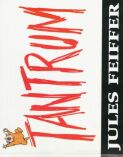

| Tantrum. By Jules Feiffer. Seattle, WA: Fantagraphics Books, 1997. 120p. $16.95. ISBN 1-56097-282-3. |

|
GENRES: AUDIENCE: NOTE: The original Knopf edition was seen. (New York: Alfred A. Knopf, 1979. 183p. $8.95hc. ISBN 0-394-50837-8.) SYNOPSIS: Next, Leo approaches his elderly parents, but his mother doesn't believe the two-year-old shouting on the front step is her son and threatens to call 911 if he doesn't leave. Crying in frustration, Leo attempts to climb in through a window, but they're all locked, so he leaves with the intention of getting a match and burning the house down. However, the passers-by he requests matches from are more interested in projecting their own problems onto him, and he flees back to the house. Mommy still won't let him in, and through the window he observes his parents interacting. With a start, Leo realizes that "They're nicer to each other when I'm not with them." He leaves. Next, he visits his brother Charlie at Charlie's office. Charlie's secretary Ms. Swallow is very attractive, but she laughs at Leo's advances as she fetches Charlie. The brothers' meeting is a mutual complaint session where it's clear that neither one is listening to the other. After another failed request of Ms. Swallow to take care of him, Leo makes a conference call to his three sisters and starts throwing a tantrum. This proves to be a big mistake, as he next finds himself in an ambulance with his chattering, overprotective sisters, who again don't listen to him as they start arguing with one another. One more attempt to get into his mother's house fails, and Leo returns to his own house, where his wife glumly gives him a rundown of how the place is falling apart since he left. In desperation, Leo's wife takes him to a divorce lawyer, where Leo is threatened with alimony and child support. He claims he's a minor and not subject to "dopey legalisms," but the lawyer is unimpressed. When Leo's wife uses the dreaded "R" word (responsibilities), Leo runs screaming out of the office. An ambulance picks him up, and at first he thinks he's going to be taken back to his sisters, but the ambulance driver instead takes him to "the others"--a secret meeting place of other adults who have fled their responsibilities by turning into children. Disgusted ("This is like a personal reproach. I thought I was unique. But now it turns out I'm part of a goddamned phenomenon!"), he refuses their offer to join them, which infuriates them and requires him to flee their wrath. Now Leo is in an airport, trying to leave the area. Two "others" spy him and attempt to get him to reveal himself, but he pretends to be a real child and they leave. By taking the place of some cameras in a photographer's camerabag, he sneaks on board a flight to Palm Springs, where Charlie's wife Joyce is vacationing. He's sure she'll take care of him, and his flight is filled with dreams of her: voluptuous, hugging him, giving him piggyback rides. He finds her--but she's on some kind of starvation diet, trying to get herself down to her "essence." She craves descriptions of food. Horrified, Leo tries to get her to eat, but she won't, so he sneaks food into the house, and when she asks him to describe it, he feeds her. (She's almost blind from the diet, among other things.) Next morning, Leo wakes up to find a note: Joyce has gone off to the desert to diet down to her essence. Leo rushes off to find her and discovers her trying to break body parts off. When she asks him to help her "break myself off at the waist," Leo turns his back on her. This act snaps her out of her self-absorption and causes her to return with Leo, eat, and dedicate herself to him. But she's only eating for his benefit, and he can't take the responsibility. He's been sitting in shock, his face and body getting more and more wrinkled and ugly. He doesn't even want a piggyback ride any more. At his request, Joyce flies him back to New York and leaves him in a basket on Ms. Swallow's doorstep. Ms. Swallow takes to Leo, though he's the ugliest baby she ever saw. She takes care of him and gives him his piggyback ride. But when she undresses and starts bathing him in the tub with her, he returns to his adult form and flees naked into the night back to his house, which is a filthy mess. After dressing, Leo commands his children to clean up, then focuses on his wife, who is furious with everyone, especially him. Feeling dreadfully sorry, he asks her what she wants, but she won't answer--she's turning blue in the face from holding her breath. In frustration, Leo throws a tantrum--with a most startling result this time! EVALUATION: Only Leo's wife stands above this kind of behavior. Her concern is always for his behavior; even when they're at the divorce lawyers, she wants him to straighten himself out. And Leo himself, despite everything, is more like her than the other adults/the "others." For the most part, his childish desires are harmless fantasies: playing piggyback, being powdered and diapered. Note that abandoning his self-absorption--becoming concerned about Joyce--starts him on his return to adulthood, though he desperately clings to childhood until his piggyback fantasy can be fulfilled by Ms. Swallow. The fantasy can't be fulfilled by Joyce, though she offers to do it; Leo's dreams of her have been tainted by responsibility. The dialogue can be odd at times, which is why I classify this as absurdist fiction. Sometimes when two people are talking, they aren't listening to one another, and their statements do not mesh at all. When a character has a long soliloquy (e.g., when Leo first encounters Joyce), the sentences spoken are often quite expository and/or stream-of-consciousness, which is OK in an absurdist book, but I personally prefer more believable dialogue no matter what the genre. As for the art, well, this book is just another example of why Jules Feiffer is rightly considered one of America's great cartoonists. One of his rushed-looking but adept pen-and-ink drawings has more life in it than, say, the entire Mercenary series, for all that series' lovely, detailed panels. Feiffer's faces are capable of an amazing amount of subtle emotion for all that they're composed of only a few lines. Although there are collections of Feiffer cartoons, I don't think there are too many graphic novels among them. (It's hard to tell from the Amazon listings, that's for sure.) This might, in fact, be his only work that can be classified as such, not counting his scripting for The Spirit. For that reason alone it deserves a place in historical and adult collections. But it's also a serious (though funny) and deep story of a kind rarely seen in comics. Tantrum is thus a splendid example of a truly adult graphic novel--ironic, ain't it? I could see it being used as a classroom or showpiece title to win over those skeptical about the form. Feiffer's name recognition is an added plus for this purpose. |
Return to Rational Magic Home
